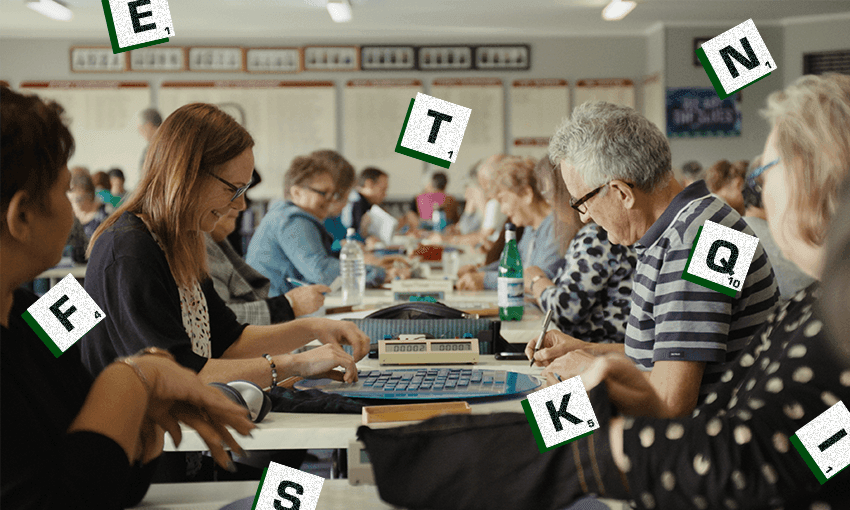Following the release of Scrabble documentary Every Word Counts, we asked the experts how beginners can improve their game.
First published on 9 November, 2023.
If you’ve only just found out about the world of competitive Scrabble, you might be wondering how a humble kitchen table player becomes capable of scoring triple digits with a single word. As Scrabbler Laura Griffiths reveals in the documentary, her secret was three hours of word study a night. For Lawson Sue, it’s listening to words on his drive to work, whereas Dylan Early does anagrams in boring meetings.
Why do they all do it? For the love of the game.
“It really is the beautiful game,” says Howard Warner, currently second in the New Zealand Scrabble ranks, and the reigning world senior champion. “I love trying to work my way through the maze of moves and tiles and try to come out the other end.” Liz Fagerlund, secretary of the New Zealand Scrabble Association and 20th in the local ranks, agrees that Scrabble is the best strategy game there is. “Every game is a bit of a lottery and a bit of a surprise,” she says. “There is an element of luck, but there is also an element of skill – you have to make your own luck too.”
For anybody looking to make their own luck in the world of Scrabble, here are 10 tips from the experts that will help you improve your game.
1. Learn the two letter words
“The two letter words are so important,” says Fagerlund. “Because then you can hook something on to one letter, and then learn what goes after them – like which ones take an S for instance – and that’s really helpful.” She learned them in her early Scrabble days by reciting them on the way to the supermarket. “When I was driving a short distance in the car, I would just quiz myself on them out loud – ‘AA? Yes. AB? Yes. AC? No’ – until I arrived.” My non-expert tip is write a little story eg “AA!” yelled the AB as it watched an AD.
2. Then learn… more words
After you’ve got the two letter words memorised, it is onto the threes. “I made a list of all the three letter words that I didn’t know, then I looked at the first 10, turned the page over, and tried to list them,” says Warner. “I didn’t let myself move on until I had those committed to memory.” Then come your “vowel and consonant dumpers” – words that are going to stink up your rack unless you get rid of them. Try EUOI for a vowel vanquisher, and CRWTH for consonant clearance.
Of course, the learning never stops in Scrabble. From there, you’ve got the four letter words to learn, but Warner also advises you absorb the words that contain high scoring letters – J, Q, X, Z – as early as possible. He also learned all the five letter words in the dictionary over one summer break, but we’d encourage you to pace yourselves. We won’t even mention the six or seven letter words at this stage for fear of you screaming “AA” like an AB watching an AD.
3. Play the board, not the rack
“People spend ages and ages hunting for a really nice word on their rack and when they finally find one, there’s nowhere for it to go, or it’s not going to score very well,” says Warner. “A much better method is to look on the board, see what hotspots are available, and then try to mould your letters to those spots. Play the board, not the rack.” Also don’t get too hung up on finding the most beautiful words, and look at the numbers instead. “It’s not about words as language, it’s just about combinations of letter that score the most points.” Look for parallel plays, where you can line all or part of a word alongside all or part of another word already on the board, and get double the points.
4. Play online, but not forever
And that’s proper online Scrabble, NOT Words With Friends. “It’s just not the same,” laughs Warner, “I’m a purist.” Although IRL Scrabble is stuck in a constant battle with online Scrabble, he still recommends playing online in “teacher mode” for beginners. “You’ll get expert commentary on on your play, so you’re learning as you go,” he explains. “Just make sure you play online in a programme that where you can play a full game, not just one turn.” You can find the best online game platforms and other handy internet resources here, but don’t get too comfortable because the next tip is going to require you to leave the house.
5. Join a Scrabble club
I’ve personally found Scrabble club to be an extremely wholesome way to get off your phone for three hours, but both Fagerlund and Warner say it is also one of the best ways to improve your game. “You are going to get much more experience playing different styles, personalities and strategies than if you are just competing against the same old partner or Granny at home,” says Warner. “You also absorb a lot of words by osmosis just from seeing them played.”
Fagerlund agrees that club Scrabble is the best Scrabble. “A lot of people play online, but the programmes do the scoring for you so you don’t have to do those things yourself,” she says. “I play a lot of friends online, but it’s not the same as sitting over the board from them and having a proper social occasion. And nothing compares to touching the tiles, you just can’t beat it.” Click here for a full list of Scrabble clubs across the country.
6. Learn anagrams
Once you’re a little bit further into your Scrabble studies, Warner recommends you start studying high probability seven letter words and their anagrams. “High probability means that the top 1000 words on the probability list will come up on your rack 80% of the time,” he explains. “If you just learn those alone, you’ll be doing really, really well, because they come up so often on your rack, based on the relative values of the tiles.”
He recommends a programme called Zyzzyva (fun fact, also the last word in the Scrabble dictionary and the name of a South American weevil), which has a function called Cardbox to test your anagram ability. “All the top players use this cardbox as a daily ritual to keep our anagram skills really sharp,” he says. “The newer players might so just learn 20 words a day, these days I could crunch through four or even 500 in a day.”
7. Try out variants of Scrabble
In Every Word Counts, there’s a scene where Warner and Dylan Early play a late night kitchen table game of Grab. “That’s about quick, top-of-mind anagramming,” he explains. There’s also Clabbers, which focuses on the awareness and manipulation of the hotspots and If Only, which hones in on anagramming using blank tiles. Warner also recommends Lexicon for kids, and Bananagrams as “a great gateway drug”, but echoes this simple sentiment from Fagerlund: “The only way to improve your Scrabble is to play Scrabble.”
8. Sign up to a tournament
Now that you know your Clabbers from your Scrabble, your CRWTHs from your EUOIs, signing up to a tournament is a great way to put your skills to the test. “I know it’s very scary for people, but that’s just because they put too much expectation on themselves,” says Warner. “I would advise people to not expect to see great results straight away, but just to sort of try and improve a little bit each time and enjoy seeing your national ranking climb steadily.” A note from a one time, one day tournament goer: it took a full two weeks for me to recover from the mental exertion.
9. Have a good attitude
“It’s a very good attribute to take the wins and the losses with good grace,” says Fagerlund. “If you are playing someone who is having a blinder of a game, don’t take that pleasure away from them by sitting there and moaning and groaning.” Also be gracious when accepting advice, especially from seasoned Scrabblers, says Warner. “When a a superior player offers you advice on your game, that’s gold. Listen to what they have to say. Or even seek advice from a competitive player that you admire, because they’ll always be flattered and happy to help.”
10. Watch Every Word Counts
Look, I’m no Scrabble scientist, but I will tell you that after I watched Every Word Counts (directed by Alexander Gandar, ranked 85th in the country), I became genuinely possessed by the Scrabble devil and triumphed against my own mother (current president of the Scrabble club, ranked 56th in the country) three times in a row AND scored my personal best of 445 points in a single game. It simply cannot hurt to try this technique for yourself.
Watch Every Word Counts here. Made with the support of NZ On Air.



